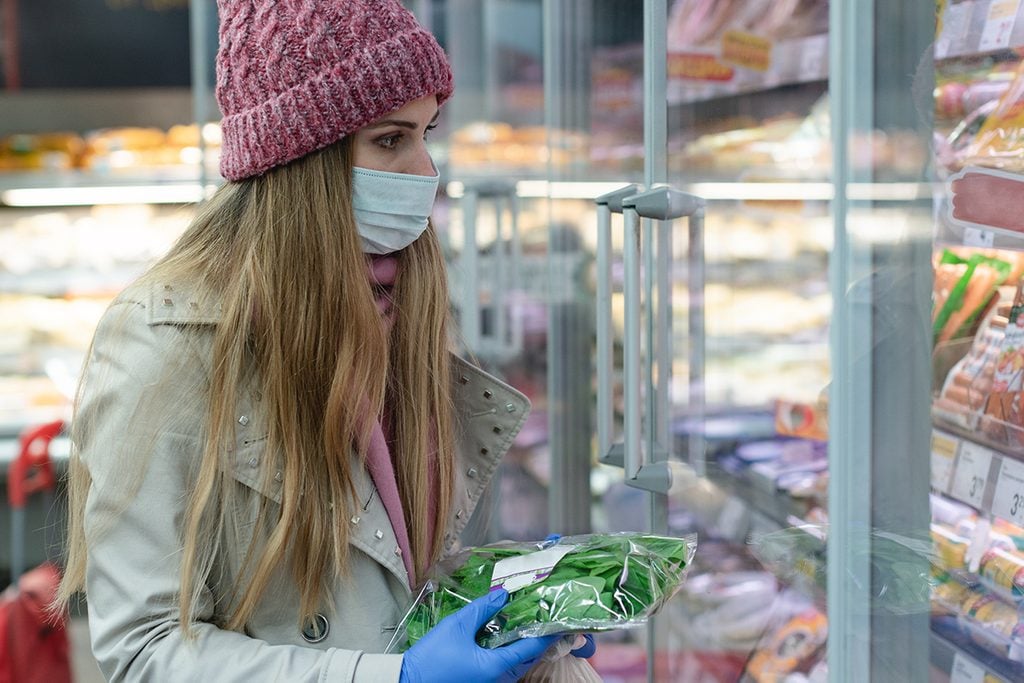Should You Still Wear a Mask While Grocery Shopping? A Nurse Explains the Latest CDC Recommendations
Updated: May 12, 2022

The CDC continues to recommend wearing a mask while out in public, even if you've had the vaccine. Here's what to know before heading to the store.
For most of us, the last few months have blurred together with a mix of jigsaw puzzles, virtual work calls and attempting to homeschool our kids (or helping them transition back to in-person learning, depending on where you are). Or perhaps you’re serving your community as an essential worker on the frontlines. Either way, even with the vaccine slowly making its way through the country, we’re all still making an effort to avoid leaving the house whenever we can. There are times, though, when we need to get to the store for necessary items like groceries or medication.
Many of us have been able to avoid the grocery store with alternatives like using grocery delivery or pickup. While these can be helpful, the long wait times and low-stock items can make it difficult to get the food you need.
For those of us still visiting the grocery store in person, we want to take every precaution we can. The Centers for Disease Control and Prevention (CDC) has continued to update their guidelines throughout the pandemic, but they’re pretty clear on one thing: we can’t let our guard down yet.
Do we still need to wear masks to places like the grocery store?
Yes, the CDC still recommends wearing masks or face coverings when going out to public settings like the grocery store or pharmacy. This is because we know that a large percentage of people with COVID-19 never show any symptoms. This means you could pass the virus onto others without ever knowing it. We also know that patients who do become symptomatic were contagious before their symptoms appeared.
It’s also important to remember that wearing a mask in public is helpful for preventing spreading the virus from you but is not as effective at protecting you from others. Your cloth covering will hopefully prevent any droplets from your talking, sneezing or coughing from reaching others. In other words, I wear a mask when I go out to protect you, and you wear a mask when you go out to protect me.
It’s necessary to note that even if you’re fully vaccinated, the CDC recommends that you continue to wear a mask in public and follow social distancing guidelines. While the vaccine has so far been effective at preventing the more severe effects of COVID-19, there isn’t enough data yet to know whether vaccinated people can spread the virus to anyone who hasn’t gotten the jab.
What kind of masks should we wear?
The CDC recommends using a cloth face-covering that covers your nose and mouth and fits snugly against your facet. Choose a mask that has at least two layers of breathable fabric. Wearing a mask that has a nose wire will make getting the right fit easier. Surgical and N95 respirator masks are still in short supply in some areas.
Homemade masks can be made out of breathable, cotton material. If you have the crafting gene, break out the sewing machine and try your skills with a DIY face mask. There is also an abundance of options on Etsy, and most large retailers are selling masks as well. Dr. Jerome Adams, the U.S. Surgeon General, put together a quick video tutorial on how to make your own mask out of a t-shirt and 2 rubber bands; no sewing required.
If you decide to make your own mask, look for fabrics you already have around the house. According to an article in the New York Times, scientists found that the most effective cloth coverings are made from thick, durable materials like pillowcases, flannel pajamas and vacuum bags. We know, it’s been a weird year.
How else can we stay protected?
The safest step any of us can take right now is practicing social distancing—continuing to avoid crowds and always staying at least 6 feet away from others. In a Sunday morning show last year, Dr. Adams explained that masks should never be used in place of social distancing. Wearing a mask is a last resort when you need to go out in public to crowded places like the grocery store or pharmacy. We are still at risk of contracting coronavirus when in close contact with others, whether or not we are wearing a mask, and we might still transmit the virus even if we’re vaccinated.
If you’re over 60 or immunocompromised, consider ordering your groceries online or looking into grocery stores with senior shopping hours, in addition to wearing a mask. And as always, wash your hands as often as you can.
